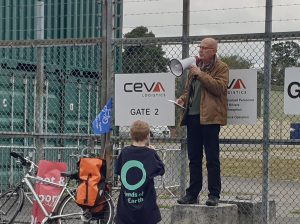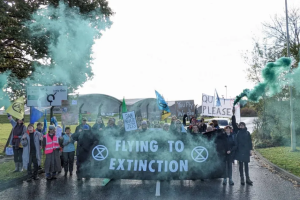We are reposting this article by Adam Bychawski which was first posted by openDemocracy.
PRIVATE AIRPORT REP WORKED WITH COPS TO THREATEN GREEN CAMPAIGNER WITH JAIL

A private airport representative worked with police to threaten a green campaigner with prison if he kept going to public meetings or asking questions.
Colin Shearn was issued with an anti-social behaviour injunction (ASBI) by Surrey Police in August banning him from public consultation meetings organised by Farnborough Airport Ltd – a private airfield near his home.
It said he had asked too many questions about its operations. If he breaches the injunction he could be jailed or fined for contempt of court.
Three weeks later, the airport, which mainly serves private jets, announcedexpansion plans to double the number of flights it operates at weekends and raise its overall cap on flights from 50,000 to 70,000 a year. It formally submitted a planning application in November.
Campaigners and civil rights groups have reacted with dismay, with one calling Shearn’s ban “retrograde and dangerous” and the organisation Liberty linking it to the government’s wider clampdown on protest rights.
openDemocracy understands that the injunction was served after Surrey Police asked the chair of the Farnborough Aerodrome Consultative Committee, a public consultation body funded by the airport, if he wished to complain about Shearn.
Farnborough Noise Group’s chair John Eriksson said the timing of the injunction was suspicious and accused the airport of trying to “suppress” its critics.
In its application for the injunction against Shearn, Surrey Police constable Katherine Farmer said the campaigner had made 589 complaints to the airport and submitted 80 questions to its consultative committee.
She added that “he is described as adopting a belligerent and aggressive style” and that “his conduct and attempts to take over the meetings and to interrupt proceedings and his ignoring of protocol has resulted in him being muted during online meetings and refused access in person”.
Farmer said the force had received a complaint about Shearn from someone who did not wish to be named but “whose business is connected to Farnborough Airport”.
The “informant” alleged that Shearn has been “conducting an aggressive and relentless campaign against Farnborough Airport, the Farnborough Aerodrome Consultative Committee, and individuals connected to these organisations over the last two to three years”.
Aldershot County Court granted Surrey Police an interim order in August. Shearn said he was given just a week instead of the statutory 14 days to prepare for the hearing.
Jules Crossley, a Labour councillor for Rushmoor Borough Council who sits on the Farnborough Aerodrome Consultative Committee, said she was among several members who complained to the committee’s chair, Philip Riley, that they had not been consulted about the police complaint.
She said Riley told them that he had only complained to police after the force approached him, and that his comments were misinterpreted as being on behalf of the committee.
openDemocracy asked Riley to comment but did not receive a response. Surrey Police said it would be inappropriate to comment before the case went to court in February.
The campaign group Safe Landing said the injunction “certainly appeared to be timed to intimidate various community groups in opposition to airport expansion, ahead of their public consultations for plans to increase private jet flights at Farnborough by a whopping 40%”.
Jun Pang, policy and campaigns officer at the human rights group Liberty, said: “It’s worrying to see attempts to hold power to account be portrayed as anti-social behaviour.
“The use of civil orders to stifle dissent are part of a wider picture of this government’s attempts to clamp down on our ability to make our voices heard by any available route, a trend that should concern us all. We all have the right to stand up for what we believe in and must resist this government’s threats to our rights.”
Shearn, a retired management consultant, said he set up Farnborough Noise Group in 2019 following changes the airport made to its flight paths that reportedly increased noise and pollution.
He denies ever acting aggressively in meetings and accuses Riley and Farnborough Airport Ltd of refusing to answer questions from the public and, on one occasion, blocking him from entering a meeting altogether. Meetings are open to the public but at the discretion of the chair.
Farnborough Airport said it did not recognise any of the claims made by Shearn but would not go into further detail.
James Radley, who is the deputy leader of Hart District Council and has been a member of Farnborough Airport Consultative Committee for more than 15 years, said was “shocked” that police had cited Shearn’s conduct in meetings to justify its ASBI.
“[Shearn] comes along to the meetings; he sits quietly and politely and listens,” he said. “When he’s invited to make a contribution he will politely ask his questions and he accepts the decision of the chairman.
“Never have I seen any of these exchanges be anything other than very polite and what you would expect a meeting to be like. I’ve certainly not seen anything ever that would justify someone taking out an antisocial behaviour order.”
Crossley similarly told openDemocracy that “[Shearn] was never aggressive or threatening or intimidating in a meeting”.
Farnborough Airport was acquired by the Australian global financial services group Macquarie in 2019. Radley, who has been a local councillor for almost 20 years, said the airport’s change in tone since the takeover had led to tensions.
“Their attitude has been more defensive and combative, rather than actually engaging in trying to pacify people,” he said.
Last month, local residents blocked access to the airport in a demonstration over its expansion plans.
Clive Teague, 75, a retired chartered structural engineer, who took part in the protest, told openDemocracy that he was horrified by the police using anti-social behaviour laws against a fellow campaigner.
“I think this is a terribly retrograde step and, quite frankly, dangerous for the whole of us and for democracy,” he said.
Macquarie has spent about £50bn on UK utility infrastructure over the past 15 years, according to the Financial Times including a majority stake in Southern Water, one of the biggest regional water monopolies; Aberdeen, Glasgow and Southampton airports; and Arqiva, a telecoms transmission company.
21.12.23
___________
also see:-
Police turned up to a coal mine operating without a licence – to arrest protesters – Glen Black, The Canary

